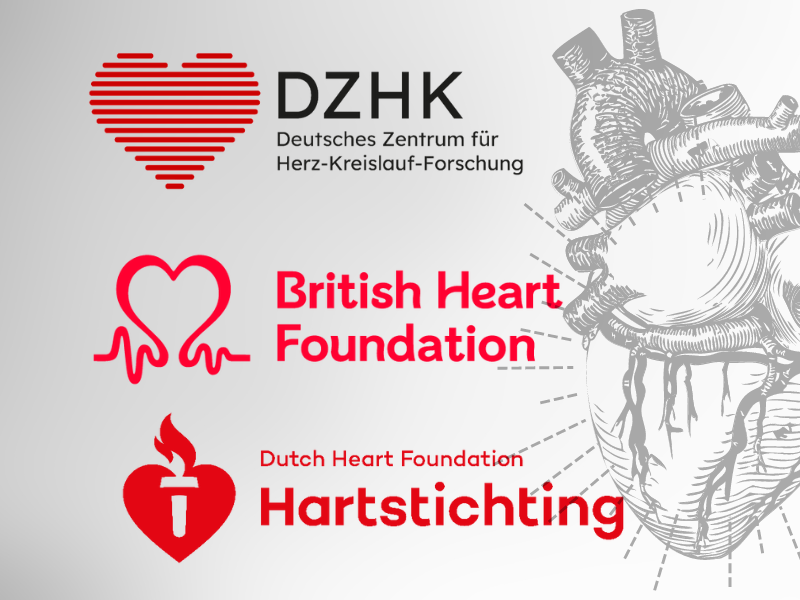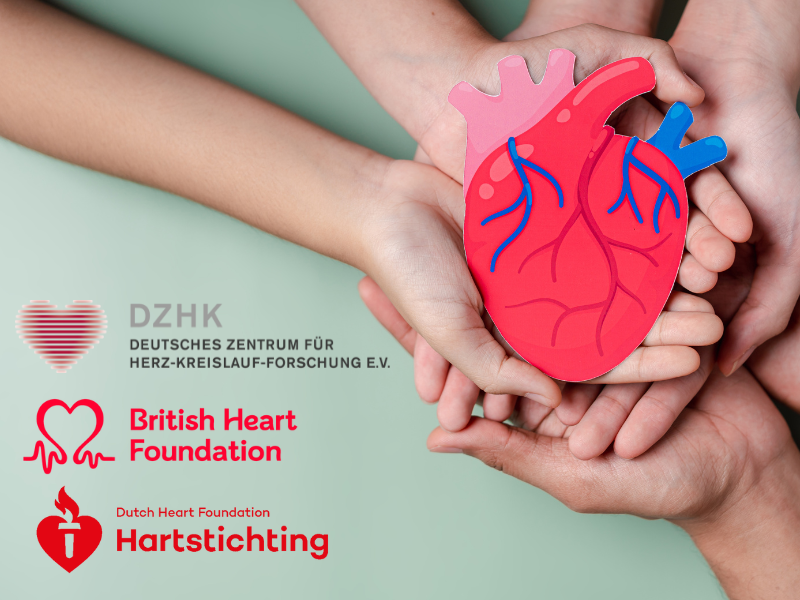Together, the three funders have awarded over €5.2 million over the next four years to four international teams. Research teams at the DZHK are involved in two projects. The projects projects will focus on understanding the underlying causes of cardiomyopathies, diseases of the heart muscle that can lead to heart failure or sudden cardiac arrest, with the aim of using their discoveries to test new possible treatments for the conditions.
This is the fifth round of awards resulting from this partnership, and the second year specifically targeted at supporting mid-career researchers in the three countries. The funding will enable researchers to pool and exchange their knowledge, expertise, and resources to tackle some of the most pressing questions in cardiovascular science and medicine. The awards will also help to accelerate the investigators’ trajectories towards becoming future leaders in their fields of research.
DZHK researchers are involved in these two projects:
Understanding the mechano-signalling role of the Z-disc in the pathogenesis of Hypertrophic Cardiomyopathy (HeartDisc)
Principal investigators: Dr Katja Gehmlich, University of Birmingham; Dr Claudia Crocini, Charité – Universitätsmedizin Berlin; Dr Diederik Kuster, Amsterdam UMC
Hypertrophic cardiomyopathy (HCM) is an inherited disease that causes the muscle wall of the heart to become thickened and stiff, making it harder for the heart to pump blood. This can lead to heart failure, as well as potentially deadly heart rhythm problems that can lead to a sudden cardiac arrest.
The researchers have found changes in a structure called the ‘Z-disc’, which forms part of the heart muscle fibre, in HCM patients. They believe that Z-discs have a crucial role in coordinating contraction of the heart muscle, acting as a central hub to sense and respond when the heart muscle contracts and pass that signal on.
The team will use several approaches, including slices of heart muscle from HCM patients, heart muscle grown from stem cells, and mouse models of HCM to explore how Z-discs sense and respond to abnormal heart muscle contraction in HCM, and how this leads to other changes seen in diseased heart muscle cells. They will use what they learn to investigate drugs that could reverse changes to the Z-discs in HCM and act as a possible treatment for the condition.
Decoding oxidative stress mechanisms in dilated cardiomyopathy: Shifting progressive impairment to cardioprotection (Shift-DCM)
Principal investigators: Dr Joseph Burgoyne, King’s College London; Dr Lukas Cyganek, UMC Goettingen; Dr Monika Gladka, Amsterdam UMC
In dilated cardiomyopathy (DCM), the muscular walls of the heart stretch, becoming thin and weak. The weakened heart muscle has to work harder to pump blood around the body, which can ultimately lead to heart failure. The condition can also cause potentially deadly heart rhythm problems that can trigger a sudden cardiac arrest. There are treatments available to manage the symptoms of DCM, but none that can stop it getting worse.
Using human heart muscle cells grown from stem cells, and mice with DCM, this project will investigate how faulty genes that cause DCM weaken the function of heart muscle cells. The researchers want to understand how this affects their ability to cope with the damage caused by molecules called free radicals, which are naturally produced as the body creates energy. Free radicals are normally kept in check by antioxidants, but when this balance is disrupted they can damage cells and tissues.
The team will then apply what they discover to study different ways to restore this balance in heart muscle. This includes molecular switches that can turn gene expression on and off, and revolutionary gene editing technologies that re-write individual letters in DNA to provide protection against DCM. The team hopes that these approaches will normalise heart function, laying the foundations for them to be developed into new treatments to slow the progression of DCM, or even stop it developing in the first place.
Contact: Christine Vollgraf, Press and Public Relations, German Centre for Cardiovascular Research (DZHK), phone +49 30 3465 529 02, presse(at)dzhk.de


